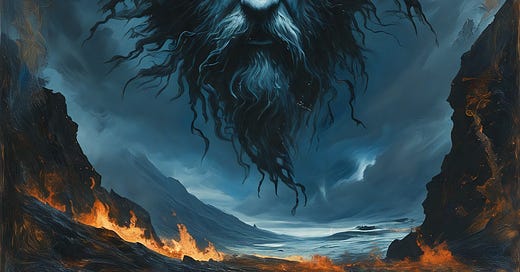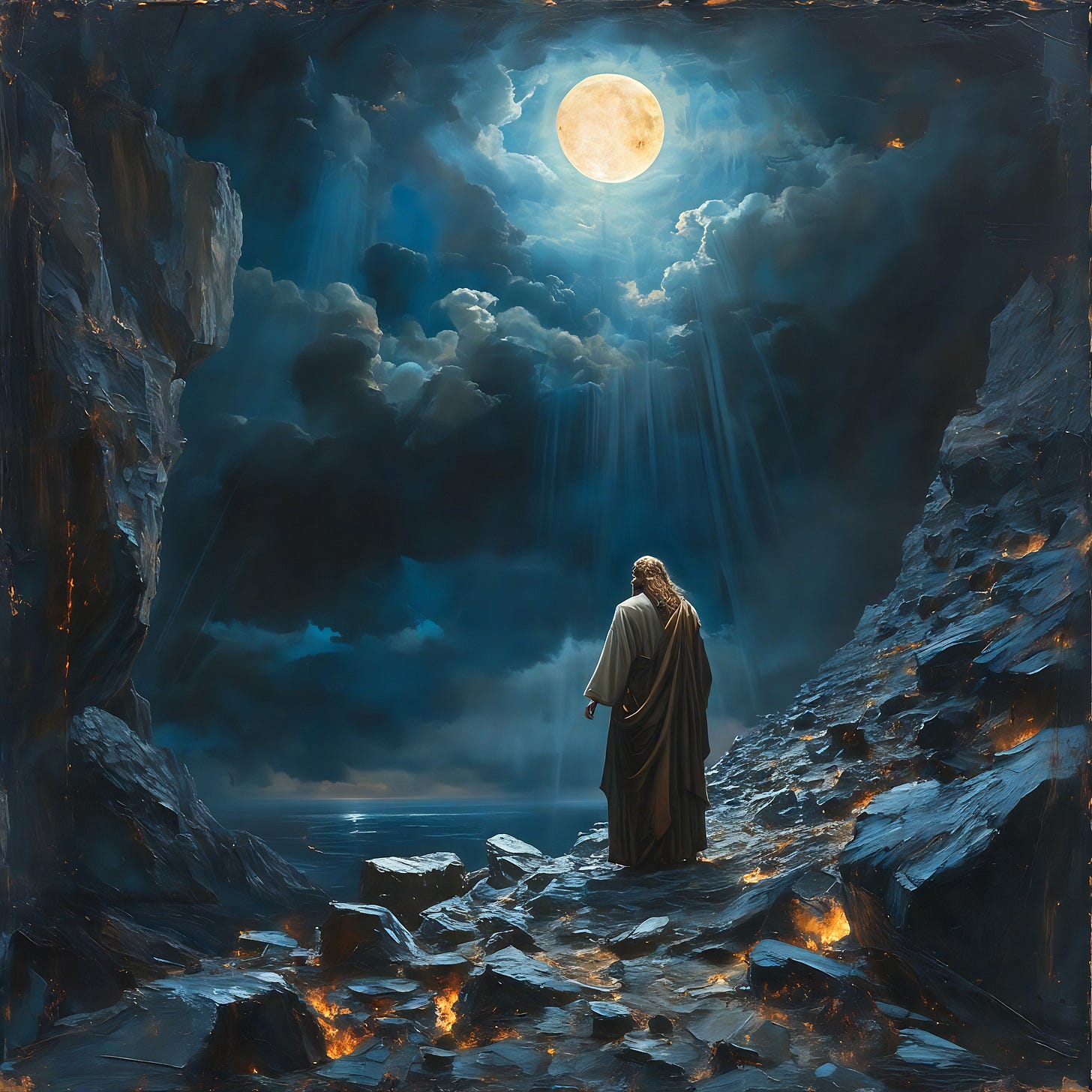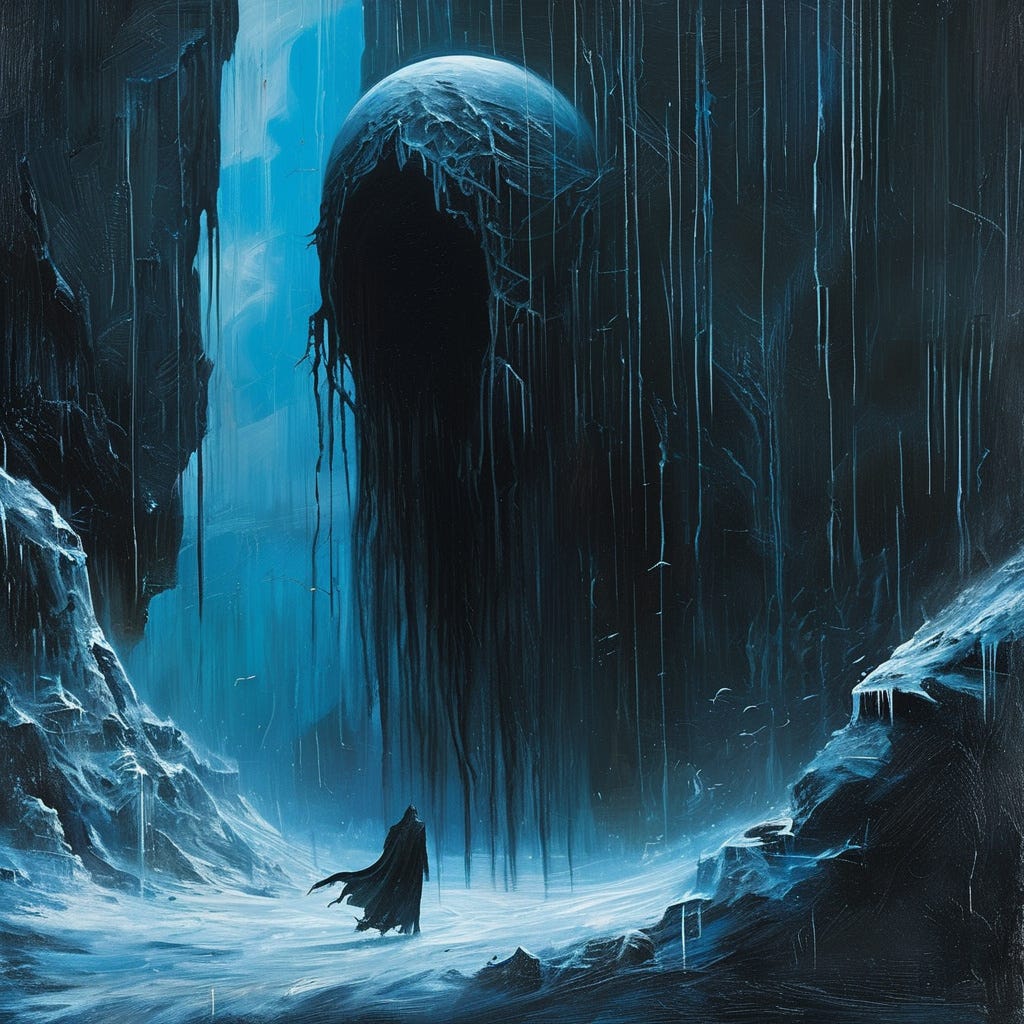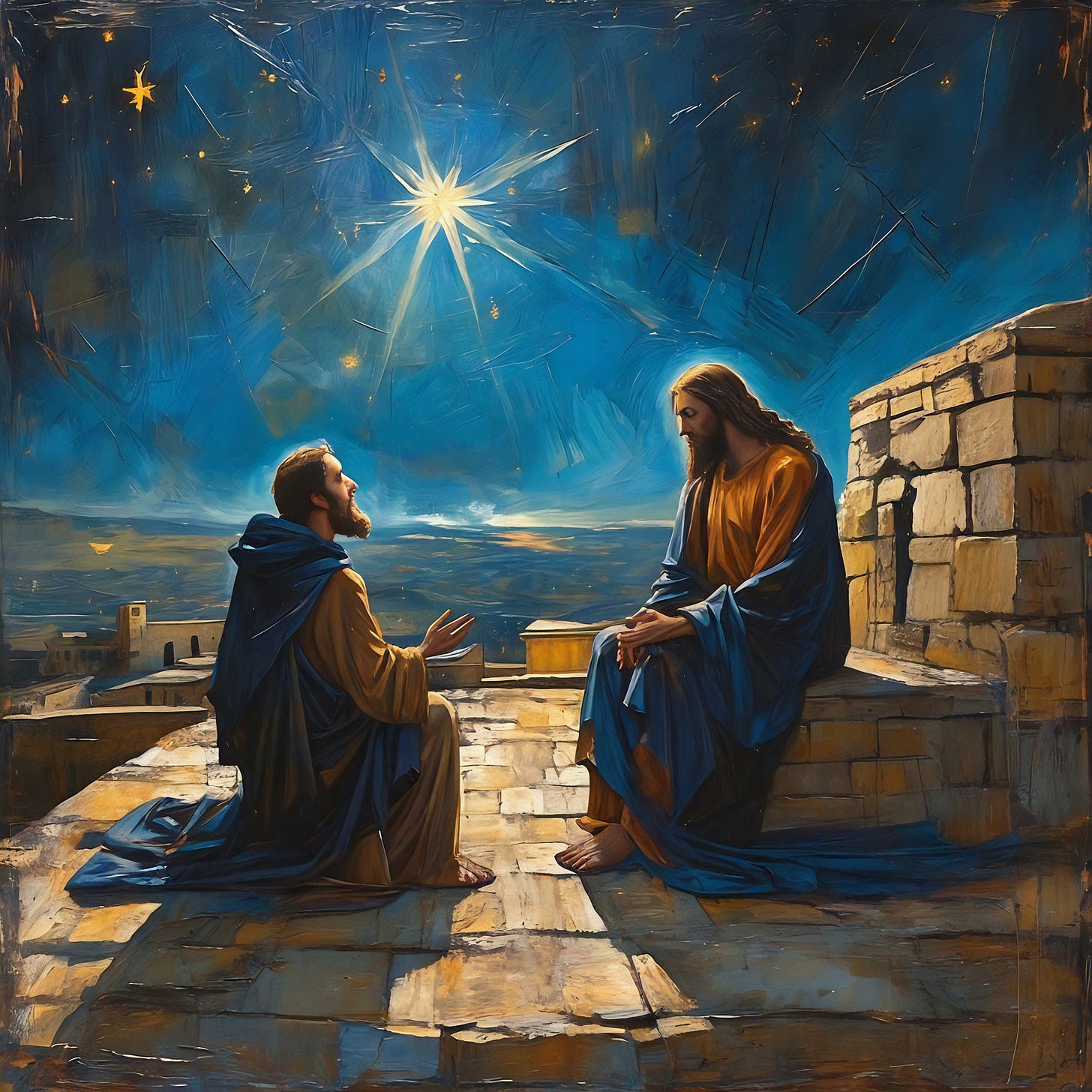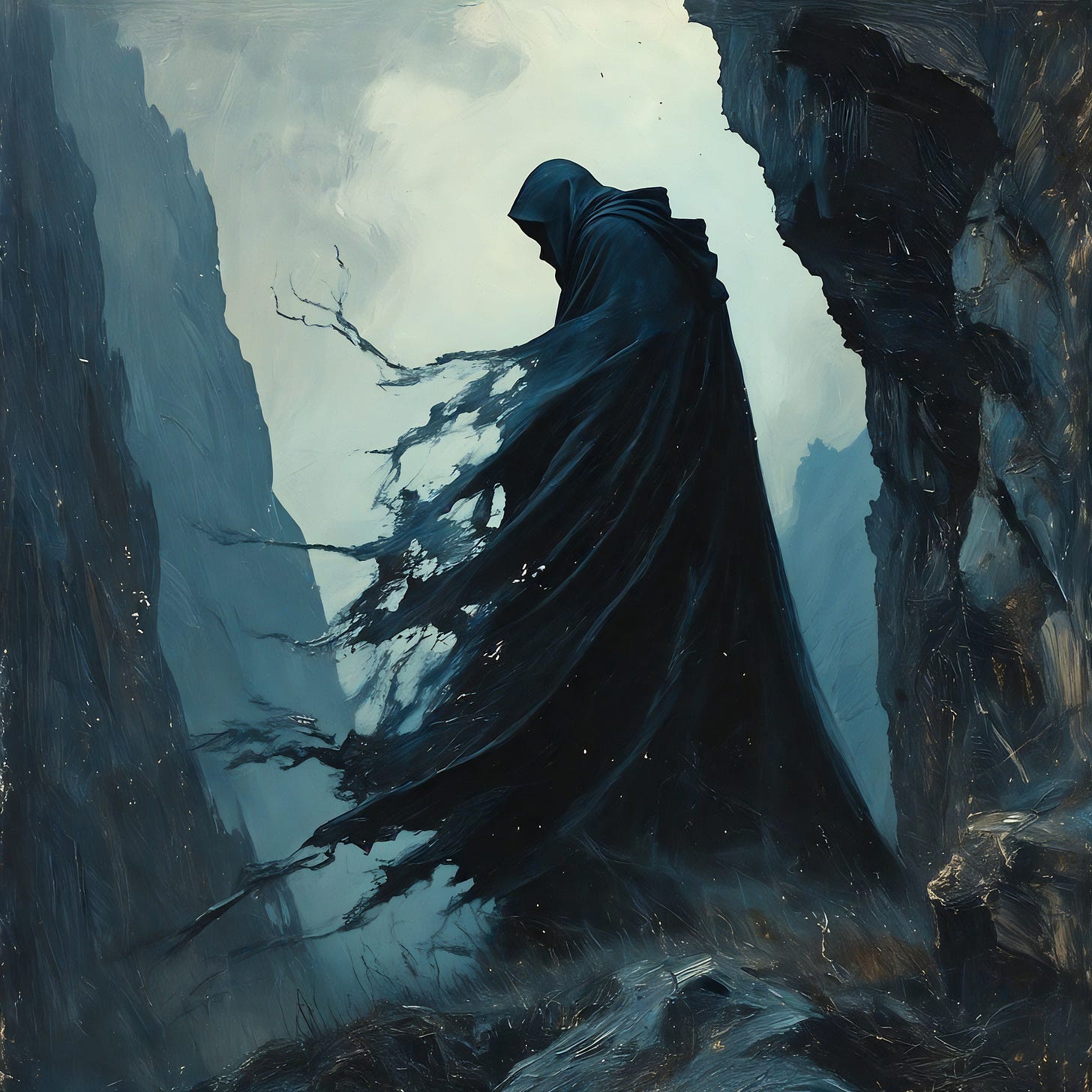In the beginning...
There was the abyss. A personal reflection on my spiritual journey thus far.
Ginnungagap: The Great Chasm of Chaos
Ginnungagap—the vast, yawning abyss of chaos—where the searing fires of Muspellheim collided with the icy, venomous waters of Niflheim. From this primal clash, Aurgelmir, the first Titan and progenitor of the Thursar, emerged. Initially taking the form of a dragon, Aurgelmir then rose from the abyss as a giant, marking the beginning of creation.
All myths begin in darkness or chaotic waters. It is the interaction between these forces—darkness and light, abyss and fire—that sparks the conditions necessary for life to emerge. Throughout my journey, I have learned that accepting the duality of life is crucial, for it is this very duality that brings us into being. Without darkness and light, how could we distinguish between good and bad? How could we evolve and grow in wisdom without these contrasting forces?
Embracing both aspects of existence is no easy task. In my local area, a black raven often flies alone, journeying from east to west on a solitary path. This path, though often misunderstood, is worthwhile. The "Hymn of the Pearl" tells of a pearl hidden deep within the abyss, guarded by a mighty dragon. The young prince must enter this darkness alone. This hymn, written by my teacher Bardaisan, is foundational to my understanding. To learn the mysteries, one must overcome the ego and recognize the interconnectedness and interdependence of all things.
The myths of the world are human stories, inspired by the breath of life that animates our bodies of clay. This life-giving breath is the essence of the divine. Mani taught that it is a shard of light—though we use many words to describe it, these are merely human constructs attempting to grasp the indescribable. The blood of Aurgelmir/Leviathan/Yam flows through our veins, while the breath of life sustains our being. Both are necessary; we are children of both the abyss and the light. Aurgelmir was slain by the gods to create the cosmos. We, too, will die, and life will continue—this is the cycle of all things. The earth and the cosmos will eventually pass away, but they will return. Time is cyclical. From the destruction of the cosmos, new life will emerge from the great abyss, and a new world will come into being.
We are not called to escape this cycle, but to embrace it. As Jesus said in the Gospel of Thomas, those who look to the heavens or the depths of the sea are in error. The Kingdom is both within us and outside of us. We are the Kingdom. Our journey through the depths of night and the light of day is a continuous dance of dualities. We are made in the likeness of both.
Jesus is the King, but not an ordinary king. He is the King of kings, who descended to this middle earth to serve and give new life to those who are dead. I have no doubts about the resurrection of Christ Jesus and His ascension. Will He come again? He is already with us, whenever two or three gather in His name. A song that has deeply touched me throughout my life is “Believe” by Savatage, which I highly recommend:
So after all these one night stands
You've ended up with heart in hand
A child alone, on your own
Retreating
Regretful for the things you're not
To all the dreams you haven't got
Without a home, a heart of stone
Lies bleeding
And for all the roads you followed
And for all you did not find
And for all the things
You had to leave behind
I am the way, I am the light
I am the dark inside the night
I hear your hopes, I feel your dreams
And in the dark, I hear your screams
Don't turn away, just take my hand
And when you make your final stand
I'll be right there, I'll never leave
All I ask of you is believe
Your childhood eyes were so intense
While bothering your innocence
For bits of string, grown-up wings
You needed
But when you had to add them up
You found that they were not enough
To get you in
Pay for sins repeated
And for all the years you borrowed
And for all the tears you cried
And for all the fears
You had to keep inside, yeah
I am the way, I am the light
I am the dark inside the night
I hear your hopes, I feel your dreams
And in the dark, I hear your screams
Don't turn away, just take my hand
And when you make your final stand
I'll be right there, I'll never leave
All I ask of you is believe, yeah
I never wanted to know, never wanted to see
I wasted my time, 'till time wasted me
Never wanted to go, always wanted to stay
'Cause the person I am, are the parts that I play
So I plot and I plan, hope and I scheme
To the lure of a night, through the unfinished dreams
And I'm holding on tight, to a world gone astray
As they charge me for years, I can't pay, yeah
I am the way, I am the light
I am the dark inside the night
I hear your hopes, I feel your dreams
And in the dark, I hear your screams
Don't turn away, just take my hand
When you make your final stand
I'll be right there, I'll never leave
All I ask of you is believe
Jesus is the light, and He is the darkness within the night. We see this in His life: torture, crucifixion, descent into Hades, resurrection, and ascension. He is raised above the powers of this world. He is in the darkness because he experienced the darkness himself. He hears our screams and sees our dreams because he is within us, whilst also transcendent. He will be by our side to the very end, ensuring we finish the race and cast down our crosses for crowns. The lyrics of the song depict our suffering in the world due to external and internal factors. The chaos sown in our lives can be due to childhood traumas, which filter out into our adult lives. These inner sores can cause relationships to become toxic, they can lead us to make bad choices. These decisions are not bad because we want them to be bad; they are simply bad because we do not know what the good truly is. Our minds have been distorted by bad parenting, abuse, bullying, experiencing loss at an early age etc. The world gone astray is profound, especially in the times we are living. It has gone astray because the focus is not on living in the Kingdom today, but on beliefs that heaven is somewhere up in the skies. It is egotistical because we have become so concerned with individuality that we lose sight of the importance of a community. Narcissism is rife in the world. One need only to go through the countless reels offering spiritual wisdom for a price. Wisdom is not a commodity, it is given freely to all who will hearken to her sweet voice!
We are gods because, when we shed our garments (the ego), we recognize our deification—that we are Christ, for He is within us. His Kingdom is eternal, but this does not negate the cyclic nature of existence; everything has its time or season. The cycle of the cosmos is eternal and ongoing. Perfection occurs when we embrace life and reject the notion that death is the final journey. The Kingdom of God is at hand; it is here to be grasped and lived in. There will always be suffering, but what happens when we transcend suffering by realizing that our lives are eternal? The wheel turns, and time moves from midnight to noon. What happens in the hereafter is entirely up to us. How do we respond to the dualistic nature of all things? We accept that without chaos, there would be no harmony. The Gospel of Truth highlights how the cross has become the tree of knowledge, whose fruits now bring life rather than destruction. Life is to be celebrated, not rejected.
We must reject the veil that locks us within hierarchical and rigid structures. Christ has liberated us by dismantling these structures, binding the strong man, and plundering his goods. But who is the strong man? He is the one who seeks to keep us in ignorance, spiritually blind, and shackled by laws and conditions. This is not life but slavery. The new Exodus offers us a path to new life, where we can share and carry one another’s burdens. This is why Jesus came to serve—so that we might serve one another without conditions. This is the Servant King, who bears no resemblance to the earthly powers of this world or the rebellious elohim of the unseen world. Christ’s victory both liberates and unites. He disrupts and brings chaos to religious establishments, making every person a priest of the Most High. The Temple is within us. The Holy of Holies represented day one of creation. Returning to Ginnungagap, day one would be when Ymir was slain, providing the materials to create the cosmos. From a Bardaisanite perspective, Ymir represents the mixture of darkness and the elements of the middle realm, from which the Logos creates the living cosmos.
This illustrates the necessity of dualism. Darkness is not inherently evil, nor is chaos. They become evil only when these polar opposites fall out of balance. Even creative gods can turn to evil, just as our own creations can be used to incite hate, construct weapons of mass destruction, and perpetuate endless harm. What is crucial is finding that harmonious balance. Divine knowledge can lead to both good and bad outcomes. A hoe can be turned into a weapon, and likewise, a weapon can be reshaped into a tool. Ultimately, the power lies with us to decide whether to use it for good or evil. This places us in the same position as the gods, which is why Jesus cited the psalm, saying, “Do ye not know that ye are gods?”
By recognizing the necessity of dualism, we can align our lives more harmoniously with the natural ebbs and flows of existence, understanding that everything has its time and season. The evils of this world can be both natural and imposed, whether by gods or by ourselves. Acknowledging this duality within ourselves can help us lead a more balanced life, one that embraces our uniqueness and celebrates diversity as a positive force. Without diversity, life itself would not be possible—each species plays a crucial role in the grand cosmic drama. We see, for instance, how the removal of a single species can cause devastating effects on local ecology, impacting it in ways we may not fully understand. Viewing our world as sacred can guide us in addressing the evils of plastics and pollution. However, I must acknowledge that the problem of microplastics has become so severe that returning to a pristine state may be impossible. We must find ways to break down plastics that work in harmony with nature rather than against it.
This is my journey so far. Some have accused me of being too fluid, but I hope this article demonstrates that I do have specific anchors. These anchors, however, are not fixed; they can shift, allowing me to gain deeper insights. My path is not "the way, the truth, and the life"—only Christ deserves that title. I am merely a pilgrim striving to live in a Christ-like manner, to understand myself in relation to others and the environment I inhabit so that I may continue to build the Kingdom rather than be confined by the garments of dogma. I am free because my allegiance lies with Christ. Bardaisan is my teacher, but he is not infallible. My studies provide me with insights, but these insights can evolve. The cosmos is constantly in motion, and I hope to dance to its rhythm rather than struggle against it. I wander this path and have encountered like-minded souls, though I can count these friends on one hand. It is not about the popularity of my views, but the richness of the dialogues I share with these friends. As Tolkien wisely wrote in The Lord of the Rings, “Not all those who wander are lost.” Like Bardaisan, I am akin to the river from which my teacher took his name—I run my course, altering only when dams are built by others or when floodwaters erode my banks, creating a new bend in my journey. Ultimately, the waters of my being will branch out into a vast delta and empty into the ocean—the source of all being itself.

